 Movies and TV
Movies and TV  Movies and TV
Movies and TV  Our World
Our World 10 Places with Geological Features That Shouldn’t Exist
 Crime
Crime 10 Dark Details of the “Bodies in the Barrels” Murders
 Animals
Animals The Animal Kingdom’s 10 Greatest Dance Moves
 Movies and TV
Movies and TV 10 Box Office Bombs That We Should Have Predicted in 2025
 History
History 10 Extreme Laws That Tried to Engineer Society
 History
History 10 “Modern” Problems with Surprising Historical Analogs
 Health
Health 10 Everyday Activities That Secretly Alter Consciousness
 History
History Top 10 Historical Disasters Caused by Someone Calling in Sick
 Animals
Animals 10 New Shark Secrets That Recently Dropped
 Movies and TV
Movies and TV 10 Weird Ways That TV Shows Were Censored
 Our World
Our World 10 Places with Geological Features That Shouldn’t Exist
 Crime
Crime 10 Dark Details of the “Bodies in the Barrels” Murders
Who's Behind Listverse?

Jamie Frater
Head Editor
Jamie founded Listverse due to an insatiable desire to share fascinating, obscure, and bizarre facts. He has been a guest speaker on numerous national radio and television stations and is a five time published author.
More About Us Animals
Animals The Animal Kingdom’s 10 Greatest Dance Moves
 Movies and TV
Movies and TV 10 Box Office Bombs That We Should Have Predicted in 2025
 History
History 10 Extreme Laws That Tried to Engineer Society
 History
History 10 “Modern” Problems with Surprising Historical Analogs
 Health
Health 10 Everyday Activities That Secretly Alter Consciousness
 History
History Top 10 Historical Disasters Caused by Someone Calling in Sick
 Animals
Animals 10 New Shark Secrets That Recently Dropped
10 Incredible Things Accomplished By Women Disguised As Men
Women, throughout most of history, haven’t shared the same opportunities as men. They’ve been relegated to their homes, with the doors that lead to the great deeds that get one’s name written into history firmly closed. At best, their names are remembered only by virtue of being somehow connected to a famous man.
But throughout those thousands of years of repression, there have been women bubbling with abilities and ideas who’ve refused to stay shut out. In a world where only men were allowed to succeed, they cut their hair, put on pants, and accomplished things their brothers refused to believe could ever be done by a woman.
10 Rena Kanokogi: The Woman Who Won A Male Judo Competition

From a young age, Rena Kanokogi (nee Glickman) wanted to be a judo master. Growing up in Brooklyn, she dedicated herself to martial arts, determined to become the best in the world.
There was just one problem: Rena was a woman. In the 1950s, when she started hungering to compete, there weren’t any judo competitions open to women—or, at least, none that were worth her while. But Rena didn’t let that stop her. She entered the 1959 New York State YMCA Judo Championship: a competition exclusively for men.
Women weren’t allowed in the competition because the judges considered them too frail and weak to compete against the men. Rena, though, didn’t just prove herself an equal—she proved herself better. She beat every man she fought and left with the gold medal around her neck.[1]
In the end, she was forced to give it up. The judges had an inkling that Rena was a woman, and when they asked, she told them the truth. Rena didn’t regret giving up the medal, though. She believed that, by telling the truth, she helped legitimize women’s judo, and that was far more important than any medal.
Rena went on to coach the women’s judo team during the 1988 Seoul Olympics and also became the first woman to become a seventh-degree black belt. Rena Kanokogi passed away in 2009 at the age of 74.
9 Dr. James Barry: The First Doctor To Perform A Successful C-Section
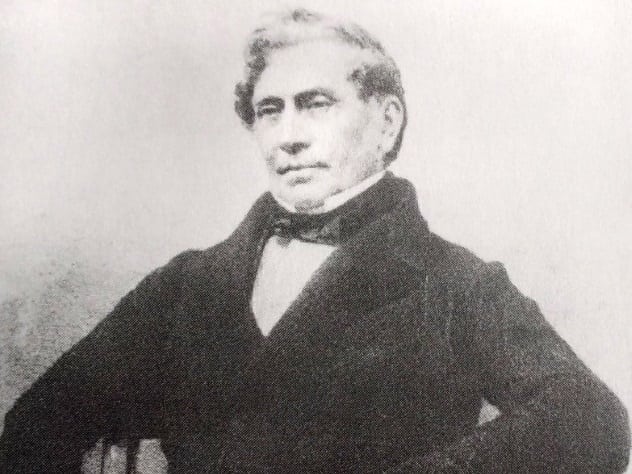
When Margaret Ann Bulky was born in Ireland in 1789, women were expressly forbidden to practice medicine. Her family, though, fell on hard times, and when the uncle who supported them died, she felt it fell on her shoulders to pull them through.
She took her uncle’s name, James Barry, and, passing herself off as him, enrolled in medical school. Her disguise made her a seem a bit eccentric. She draped herself in an overcoat no matter how hot the weather, spoke in an affected deep voice, and had 8-centimeter (3 in) inserts in all of her shoes—but she did well enough in her studies that her teachers let their lingering doubts go.
By the age of 22, she was an assistant surgeon in the military, and by 1857, she was the inspector general in charge of all military hospitals. She was one of the most successful medical experts of her day. In fact, she was the first surgeon to perform a caesarian section and get both the mother and baby through it alive.[2] (Sources vary on whether she was the first to do so in Africa or in the British Empire.)
She left a request in her will asking to be buried in the clothes she died in, without having her body washed. Her wishes, though, were not followed, and as a nurse prepared her body for burial, she found out that one of the most respected men in medicine was actually a woman.
8 Khawlah Bint Al-Azwar: The Woman Who Led The Muslim Army Against The Byzantine Empire
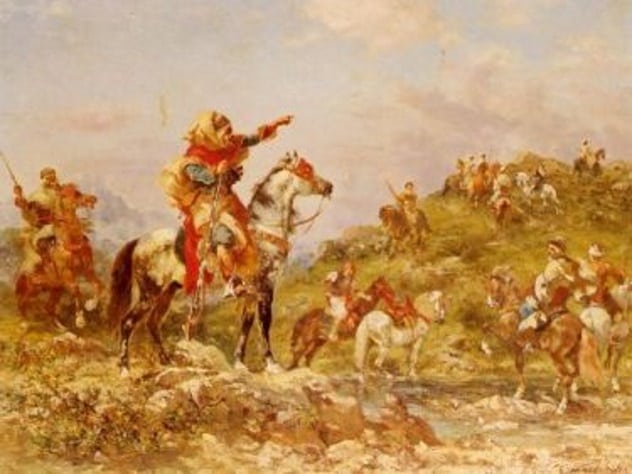
When the early Muslims led their armies against the Byzantine Empire in the seventh century, a young woman named Khawlah bint al-Azwar followed along.[3] Her brother, Dhiraar Ibn al-Azwar, was a commander in the army, and she came along as a nurse to make sure someone was ready to heal his wounds.
When her brother was captured, though, during the Siege of Damascus, Khawlah refused to let him rot in a prison cell and die. She put on armor, veiled her face, and took his place on the battlefield alongside the other men.
Khawlah fought so bravely and ferociously that the army’s general, Khalid Ibn Walid, personally met with her to recognize her as the hero of the battle. The whole army was shocked when she revealed her face.
Instead of kicking her out, though, Khalid let her lead a rescue mission to free her brother. Khawlah led a battalion of men into the Byzantine camp, rescuing her brother and every prisoner of war the Byzantines had captured.
Khawlah followed the army from then on, initially the only woman fighting in an army of men. That changed, though, when she was captured by the Byzantines and thrown into a prison for women. Khawlah armed her fellow prisoners with tent poles and pegs, leading her own crudely equipped female army in a violent jailbreak that ended with 30 Byzantine soldiers dead and countless women freed by their own strength.
7 Agnodice: The First Female Doctor Of Greece
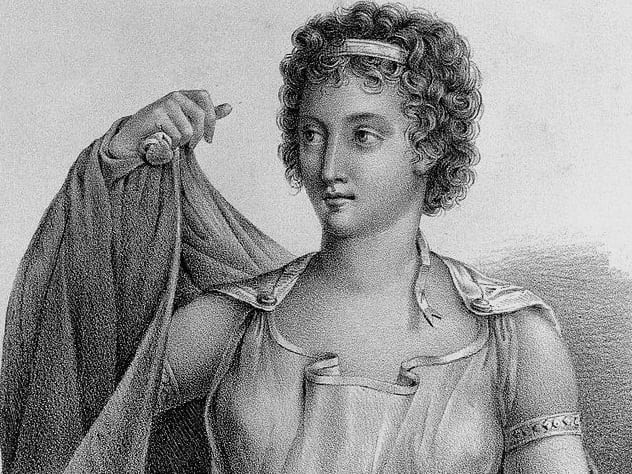
Ancient Greece was notoriously cruel to women. It was a place where women were expected to stay silent and obey their husbands, a place where they said: “The best reputation a woman can have is not to be spoken of.”
For a woman to practice medicine in Greece was absolute and complete gall. It was so contemptible that any woman who even tried would be sentenced to death. According to the Roman historian Gaius Julius Hyginus, though, one woman named Agnodice dared to do it anyway.
According to the story, Agnodice disguised herself as a man, studied medicine, and became one of the most successful doctors in Athens. She specialized in helping women in labor and was so popular with her patients that her male colleagues accused her of seducing them.
The men were so convinced she was luring away their patients through illicit means that they took her to court for sexually abusing patients. During the trial, though, Agnodice shocked the court by revealing that she was a woman—and guaranteeing herself a certain death.
Her patients saved her life. When word got out that Agnodice was to be executed, they flooded into the courthouse, insisting that Agnodice had revolutionized female health care. One woman told the courts: “You are condemning her who discovered health for us!”[4]
To everyone’s surprise, the courts listened. The story goes that Agnodice was allowed to live and to continue practicing medicine, and the law in Athens was changed. Because of her, women were finally allowed to become doctors.
6 One-Eyed Charley: The First Woman To Vote In The United States
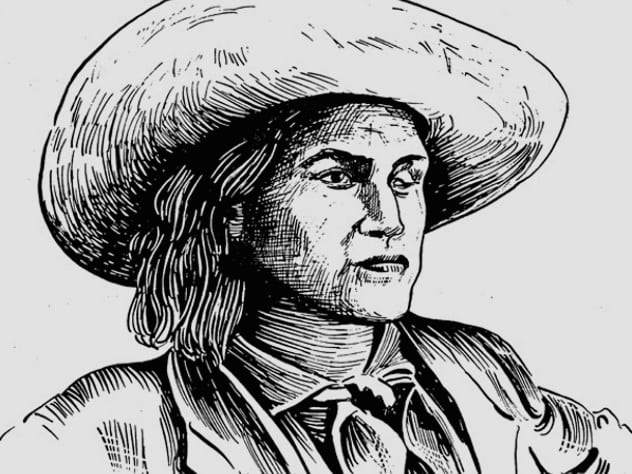
One-Eyed Charley was born Charlotte Parkhurst in 1812, but somewhere along the line, she changed her name. Charlotte put on a pair of pants and became One-Eyed Charley: one of the most feared names in the Wild West.
Unlike the other women in this list, One-Eyed Charley probably wasn’t just in disguise for a job. It’s believed that Charley self-identified as a man and decided to live as one. But man or woman, Charley made history.
One-Eyed Charley was one of the toughest, hardest-drinking cowboys on the American frontier. He’d lost his eye after being hoofed in the face by a horse, and it seemed to have left him bitter. He worked as a stagecoach driver and had a reputation for carrying guns and having an itchy trigger finger. The bandit Sugarfoot found that out firsthand when he tried to hijack One-Eyed Charley, only to find out that Charley was just as ready to put a bullet in someone’s stomach as Sugarfoot was—and twice as fast on the trigger.
Nobody questioned Charley’s gender until he died. Even for a man, he had an unusually deep and gruff voice. It wasn’t an affectation—Charley’s lifelong habit of chewing tobacco had left him with mouth cancer. That’s why it was such a shock when they got his body ready for burial and realized he’d been born a woman.
By then, though, Charley had already done something worthy of the history books. In 1867, he’d registered to vote in California—making him the first person born as a woman to cast a vote in an American election.[5]
5 Renee Bordereau: The Woman Napoleon Wanted Dead
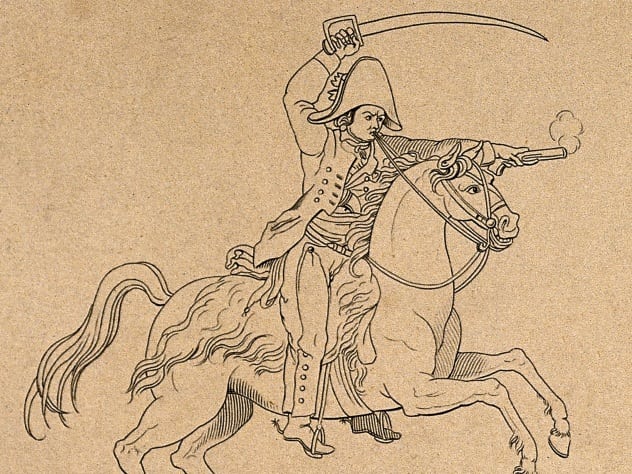
Renee Bordereau lost 42 family members to the French Revolution. Though the battle was for liberty and equality, the revolutionaries’ aim wasn’t always squarely aimed at the aristocracy. Many of the Bordereaus, a family of peasants, met their ends at their hands, including Renee’s father, who died before her very eyes.
When the Royalists revolted against the Revolutionaries in 1793, Renee Bordereau jumped on the opportunity for revenge. She put on a disguise, took her brother’s name of Hyacinthe, and charged into battle.
She was one of the most feared fighters in the Royalist army. She was famous for riding into battle with a horse’s bridle between her teeth so that her hands were free to carry a sword and a gun at the same time. It made her a brutal force to contend with—legend has it that, in her first battle alone, she killed 17 men.
The French thought she was invulnerable. She fought 200 battles and was so notorious that Emperor Napoleon put a 40,000-franc bounty on her head.[6]
In time, her brothers-in-arms realized that their greatest fighter was a woman. Still, they kept her on, with one soldier famously pointing her out by saying:
See that soldier who has sleeves of a color different from his coat? That’s a girl who fights like a lion.
4 Kathrine Switzer: The First Woman To Run In The Boston Marathon
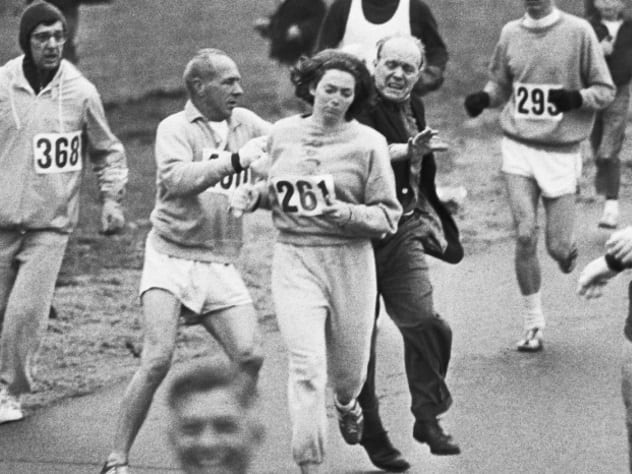
There was no women’s running team at Syracuse University in the 1960s, when Katherine Switzer was there, but she was determined to run anyway. She entered the only group they had, the men’s cross-country team, and immediately told her coach that she wanted to get ready to run the Boston Marathon.
At the time, women were banned from participating on the belief that they were too “fragile” to run a marathon, but Switzer was determined. Her coach didn’t think she could do it. Trying to dissuade her, he challenged her to run a full 42 kilometers (26 mi) in training—so Switzer, just to prove a point, ran 50 kilometers (31 mi) instead.[7]
To get past the judges, Switzer signed up for the 1967 Boston Marathon as “K.V. Switzer.” She showed up in a baggy sweatshirt, hoping to avoid attention—but her disguise wasn’t exactly the best. Switzer insisted on wearing lipstick while she ran, making it obvious to everyone who saw her that this was no man.
She got off to a great start, but while she was running, an official, furious that a woman was running the marathon, stormed onto the track and tried to tackle her, yelling: ”Get the hell out of my race and give me those numbers!” The incident erupted into a full-on brawl as Switzer’s friends came out to help her. With all the commotion, she didn’t have much of a chance of winning—but out of sheer stubbornness, she ran the race to the end anyway.
She lost her first marathon, but she ran the Boston Marathon another seven times after that. She ran countless other marathons as well, with her greatest win coming in the New York City Marathon of 1974. Switzer didn’t just get first place—she finished a full 27 minutes before the next woman crossed the finish line.
3 Saint Marina: The Sainted Monk Who Was Secretly A Woman
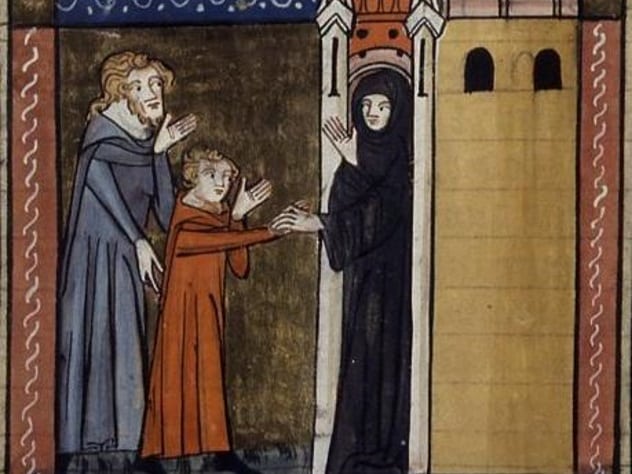
When Saint Marina’s mother died, her father decided to give up everything and become a monk. Marina, with nowhere else to go, followed him into the monastery, disguising herself as man and calling herself “Marinos.”
In time, Marinos became a respected monk at the monastery. Years of developing a strong reputation, though, were shattered when a local innkeeper’s daughter came into the monastery pregnant, insisting that she’d been violated by Father Marinos.[8]
Obviously, Marina hadn’t impregnated the woman, but she refused to deny it. If she did, the baby would be doomed to a short life of neglect. And so, to make sure the child had a parent, Marina pretended to be his father and took him in.
She was kicked out of the monastery and sent out into the streets, where she had to beg to survive. Still, she did her best to take care of the child, working with so much devotion that, in time, her fellow monks invited her back in.
The child she raised became a monk himself, and the two lived in the monastery together until Marina’s death. It wasn’t until they started to prepare her body for burial that anyone realized she was a woman—and, clearly, innocent of all accusations.
2 Trotula Of Salerno: The World’s First Gynecologist

Trotula of Salerno has been called the world’s first gynecologist.[9] Way back in the 11th century, she was a respected physician in Italy, working as the chair of medicine at the School of Salerno. There, she published a whole series of books on health care, full of ideas that would change medicine for centuries.
She didn’t exactly have to dress like a man. Italy, at the time, accepted a small number of female doctors, and Trotula was able to work without hiding her gender. Her books, though, were another matter. The world struggled with the idea of reading a treatise on medicine written by a woman, so some were published under a man’s name.
She was responsible for countless breakthroughs in women’s health, with new ideas on supporting patients through menses, conception, pregnancy, and childbirth. She introduced painkillers during childbirth when they were forbidden and was one of the first people to realize that men could be responsible for infertility.
In her own era, she earned a fair amount of respect as a woman—but as time went on, people refused to believe that woman was capable of the things that she had done. During the Renaissance, copies of her medical text were republished with a man’s name instead of her own. Even when she didn’t pretend to be a man, other people disguised her anyway.
1 Jeanne Baret: The First Woman To Circumnavigate The Globe
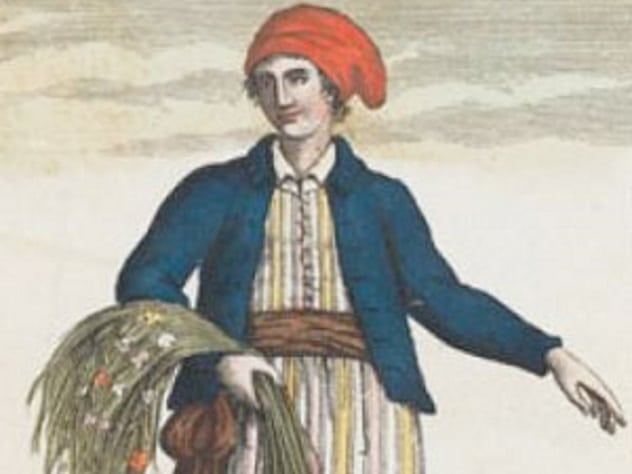
Not every story ends well. The story of Jeanne Baret, the woman who dressed up as a man to travel around the globe, is a great moment in history—but it ends in horrifying tragedy.
Jeanne Baret joined Louis Antoine de Bougainville’s round-the-world expedition as a botanist in 1766. Her boyfriend, Philibert Commerson, had already signed up for the trip and, not wanting to be apart from Baret, convinced her to dress up as a young boy and sign on as his assistant.
The two sailed around the world together, identifying countless plants for the first time and making Baret the first woman to circle the globe.[10] A whole genus of plants they discovered was even named after her. Commerson called them Baretia, saying that the flowers, like her, were defined by contradiction.
In time, though, the crew realized that Baret was a woman. The official story, for years, has been that the natives of Tahiti recognized her gender and told the crew—but more recently, historians have found a different account, recorded in three different men’s journals, that is far more horrifying.
While their ship was near Papua New Guinea, three men on the crew, who’d figured out that she was a woman, beat and brutally gang-raped her. By law, the men who did it should have been hanged. Instead, the crew covered it up, letting the men go free while Baret was left with her skin torn and a baby, conceived by one of the men who’d attacked her, growing inside her.
Baret made history as the first woman to circle the world—but for a woman in her time, making history came at a horrible cost.
Read about more amazing women through history on 10 Amazing Women Who Led Rebellions and 10 Badass Women Who Went To War.








